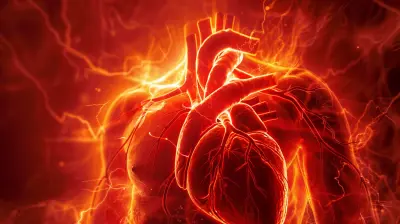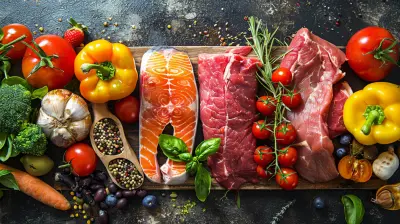The Science Behind Low Carb Diets: Do They Really Work?
27 January 2025
When it comes to diets, it seems like every year brings a new trend, and for the past couple of decades, low-carb diets have been riding the wave of popularity. Whether it’s Atkins, Keto, or any variation in between, chances are you’ve heard someone singing the praises of cutting carbs. But here’s the question: What’s the science behind low-carb diets, and do they really work? Let’s pull back the curtain and dig into what makes this diet tick.
What Is a Low-Carb Diet?
First, let’s get the basics out of the way. A low-carb diet is pretty much what you’d expect—it’s a way of eating that limits your intake of carbohydrates. Instead, you lean more heavily on protein and fats. Think less bread, pasta, and sugar, and more meat, eggs, vegetables, and healthy oils.Now, this isn’t some fringe idea. Your body uses carbs as its primary energy source. When carbs are limited, it has to switch gears and tap into an alternative fuel source: fat. This metabolic shift is at the heart of why low-carb diets are so popular, and it’s all tied to something called ketosis. (Don’t worry, we’ll cover that in a second.)
How Does It Work? The Science Explained
1. The Role of Insulin in Fat Storage
Low-carb diets are often praised for their effects on insulin. Here’s why: when we eat carbs, our body breaks them down into glucose (sugar). This sugar enters our bloodstream, and in response, our pancreas releases insulin. Insulin’s job is to shuttle that glucose into our cells for energy.The catch? Insulin also signals your body to store fat. So, when you’re constantly eating high-carb foods, your insulin levels stay elevated, which can make it harder to burn fat. Low-carb diets, on the other hand, keep insulin levels low, creating a more fat-burning-friendly environment.
2. Ketosis: Your Body’s Backup Energy Plan
When carbs are restricted, your body goes into a metabolic state called ketosis. Think of it as a backup generator kicking in when the power goes out. Instead of using glucose for energy, your liver starts breaking down fat into molecules called ketones, which your body (including your brain!) can use as fuel.This process can lead to rapid fat loss, especially in the initial stages of a low-carb diet. And it’s all thanks to the fact that your body is burning through its fat stores—not carbs—for energy.
Do Low-Carb Diets Actually Help You Lose Weight?
Let’s be real—most people aren’t trading their morning bagels for scrambled eggs because they love eggs that much. They’re doing it to lose weight! But does it really work? The short answer is: Yes, for most people.Here’s why:
1. Reduced Appetite: Studies show that low-carb diets tend to naturally reduce appetite. This makes it easier to eat fewer calories without feeling like you’re starving.
2. Improved Satiety: Protein and fats are more filling than carbs. When you load up on steak and avocado, you’re less likely to reach for a snack an hour later.
3. Water Weight Loss: During the first week of going low-carb, people often lose a noticeable amount of weight. This isn’t all fat, though—it’s largely water. When you eat carbs, your body stores them along with water. Cut the carbs, and the water weight goes, too.
The Health Benefits of Low-Carb Diets (Beyond Weight Loss)
Low-carb diets aren’t just about shedding pounds. They’ve been linked to a range of other health benefits, too. Let’s take a peek:1. Better Blood Sugar Control
If you’re someone dealing with insulin resistance or type 2 diabetes, a low-carb diet can be a game-changer. By cutting back on carbs, you reduce blood sugar spikes and improve your insulin sensitivity. In fact, some people have even been able to reduce their need for diabetes medications by adopting a low-carb lifestyle.2. Improved Heart Health
Wait—doesn’t eating more fat mean your heart will hate you for it? Not necessarily. Research suggests that low-carb diets can improve key markers of heart health, like triglyceride levels and HDL (the “good” cholesterol). Just remember: the kind of fat matters. Think olive oil, nuts, and fatty fish—not bacon cheeseburgers every day.3. Cognitive Boost
Some studies suggest that ketones (those magical molecules your body makes on a low-carb diet) can be a great energy source for your brain. In fact, ketogenic diets were originally developed to help treat epilepsy, and there’s ongoing research into their potential to improve focus, memory, and even conditions like Alzheimer’s.Are There Any Downsides?
Before you ditch your cereal and stockpile eggs and avocados, let’s talk about the flip side. Like any diet, low-carb eating has its challenges.1. The Dreaded “Keto Flu”
If you’ve ever tried going low-carb, you might’ve experienced something called "keto flu." It’s not an actual flu, but it can feel awful—headaches, fatigue, irritability, and muscle cramps. This happens as your body adjusts to burning fat for fuel instead of carbs. The good news? It usually passes in a few days.2. Nutrient Deficiencies
Cutting out entire food groups can make it tricky to get all your nutrients. For example, fruits, whole grains, and legumes are good sources of fiber, vitamins, and minerals. On a strict low-carb diet, you’ll need to get creative with veggies and supplements to fill those gaps.3. Sustainability
Here’s a biggie—low-carb diets can be tough to stick to long-term. Bread, pasta, and rice are cultural staples for a reason. Plus, social situations (like dinner parties or eating out) can get tricky when your options are so limited.Who Should (and Shouldn’t) Try a Low-Carb Diet?
Okay, so low-carb diets have their pros and cons. But are they right for you?Who Might Benefit:
- People looking to lose weight (especially if past diets haven’t worked).- Those with insulin resistance or type 2 diabetes.
- Individuals interested in improving their heart health or blood sugar control.
Who Should Be Cautious:
- Pregnant or breastfeeding women (always consult your doctor first).- People with kidney issues (a high-protein diet can be tough on the kidneys).
- Athletes or anyone with high energy needs—carbs are your body’s natural fuel source, so cutting them might impact performance.
Tips for Success on a Low-Carb Diet
If you’ve made it this far and you’re ready to give low-carb a shot, here are a few tips to set you up for success:1. Start Slow: Instead of cutting carbs cold turkey, gradually reduce your intake. This can help minimize side effects like keto flu.
2. Load Up on Veggies: Not all carbs are created equal. Non-starchy veggies like spinach, kale, and zucchini are low-carb and packed with nutrients.
3. Prioritize Healthy Fats: Avocados, nuts, seeds, and olive oil are your best friends here. Skip the trans fats and focus on quality over quantity.
4. Stay Hydrated: Low-carb diets can lead to water loss, so drink up! Adding a pinch of salt to your water can also help replace lost electrolytes.
5. Plan Ahead: Meal prepping can be a lifesaver, especially when cravings strike or life gets busy.
So, Do Low-Carb Diets Really Work?
At the end of the day, there’s no magic bullet when it comes to dieting. However, the science behind low-carb diets is solid, and they’ve proven effective for many people looking to lose weight or improve their health. That said, no diet works unless it’s sustainable for YOU. If giving up bread forever sounds like torture, then maybe a more balanced approach is what you need.Remember, it’s not just about cutting carbs—it’s about finding a way of eating that feels good, fuels your body, and fits your lifestyle. Whether that’s low-carb or something else entirely, the key to success is consistency. So, grab an avocado, do your research, and find what works for you!
all images in this post were generated using AI tools
Category:
Low Carb DietAuthor:

Arthur McKeever
Discussion
rate this article
9 comments
Azura Carter
In whispers of science, low carbs unveil, Weight lost, energy gained—truth prevails, A journey to health, where balance prevails.
February 7, 2025 at 4:48 AM

Arthur McKeever
Thank you for your poetic perspective! Indeed, low-carb diets can promote weight loss and energy balance, supported by scientific research.
Holden McKeever
Oh, absolutely! Let's ignore the countless success stories and stick to our beloved bread and pasta. Who needs energy when you can binge on carbs and feel like a car crash? Science schmience—pass me those carbs and my blissful denial, please!
February 5, 2025 at 5:40 PM

Arthur McKeever
While carbs can be comforting, the science supports low-carb diets for sustained energy and health benefits. Balance is key!
Charlie Hubbard
Low carb diets can be effective for weight loss, but individual results vary. Consult a nutritionist for guidance.
February 3, 2025 at 3:55 AM

Arthur McKeever
Thank you for your comment! Individual responses to low carb diets do indeed differ, so consulting a nutritionist can provide tailored guidance for optimal results.
Zyana Cummings
Thank you for sharing this insightful article! Understanding low carb diets can be daunting. It's important to approach dietary changes with care and listen to our bodies.
February 2, 2025 at 3:49 AM

Arthur McKeever
Thank you for your thoughtful comment! I'm glad you found the article insightful. Listening to our bodies is indeed crucial when making dietary changes.
Thornewood Campbell
Low-carb diets can be effective for weight loss and metabolic health, but individual responses vary. It's essential to consider personal goals and sustainability when choosing dietary approaches.
February 1, 2025 at 5:27 PM

Arthur McKeever
Thank you for your insights! You're absolutely right—individual responses can differ significantly, and personal goals and sustainability are key to finding the right dietary approach.
Sorin Underwood
This article effectively summarizes the mechanisms of low-carb diets, highlighting their impact on insulin levels and fat metabolism. The evidence presented supports their efficacy for weight loss and improved metabolic health. However, individual responses vary, so it's essential to consider personal health goals and consult a healthcare professional before starting.
February 1, 2025 at 4:47 AM

Arthur McKeever
Thank you for your thoughtful comment! I'm glad you found the article informative. Individual responses to diets are indeed important, and consulting a healthcare professional is always recommended for personalized guidance.
Anastasia Benton
Who knew carbs could be tricky?
January 31, 2025 at 4:41 PM

Arthur McKeever
Absolutely! Carbs can be complex, and understanding their impact on our bodies is key to effective dieting.
Sera Garcia
“Low carb diets: where bread becomes the bad guy and veggies get to wear capes!”
January 31, 2025 at 3:37 AM

Arthur McKeever
Great analogy! Low-carb diets can shift our focus, but balance is key for long-term health.
Bella Bell
Low carb diets: the trendy escape plan for carb-haters. Sure, they might work, but at what cost? Because let's face it, life without bread is just sad.
January 27, 2025 at 5:31 AM

Arthur McKeever
While low-carb diets can lead to weight loss and improved health markers for some, it's essential to consider individual preferences and sustainability. Balance and moderation can often yield better long-term results than extreme restrictions.
MORE POSTS

Best Supplements to Support Your Keto Lifestyle

Warning Signs of Heart Disease You Shouldn’t Ignore

Cycling for Mental Clarity: Combining Fitness with Mindfulness

The Connection Between Sugar and Hormonal Imbalance

Is the Paleo Diet Sustainable for Fitness Enthusiasts?

Common Paleo Substitutes for Dairy and Grains

Unlocking Core Strength: Ab Workouts That Make a Difference